- Home
- Neil Gaiman
The View from the Cheap Seats Page 2
The View from the Cheap Seats Read online
Page 2
It’s tosh. It’s snobbery and it’s foolishness.
There are no bad authors for children, that children like and want to read and seek out, because every child is different. They can find the stories they need to, and they bring themselves to stories. A hackneyed, worn-out idea isn’t hackneyed and worn out to someone encountering it for the first time. You don’t discourage children from reading because you feel they are reading the wrong thing. Fiction you do not like is the gateway drug to other books you may prefer them to read. And not everyone has the same taste as you.
Well-meaning adults can easily destroy a child’s love of reading: stop them reading what they enjoy, or give them worthy-but-dull books that you like, the twenty-first-century equivalents of Victorian “improving” literature. You’ll wind up with a generation convinced that reading is uncool and, worse, unpleasant.
We need our children to get onto the reading ladder: anything that they enjoy reading will move them up, rung by rung, into literacy.
(Also do not do what this author did when his eleven-year-old daughter was into R. L. Stine, which is to go and get a copy of Stephen King’s Carrie, saying, “If you liked those you’ll love this!” Holly read nothing but safe stories of settlers on prairies for the rest of her early teenage years, and still glares at me whenever Stephen King’s name is mentioned.)
The second thing that fiction does is to build empathy. When you watch TV or see a film, you are looking at things happening to other people. Prose fiction is something you build up from twenty-six letters and a handful of punctuation marks, and you, and you alone, using your imagination, create a world, and people it and look out through other eyes. You get to feel things, visit places and worlds you would never otherwise know. You learn that everyone else out there is a me, as well. You’re being someone else, and when you return to your own world, you’re going to be slightly changed.
Empathy is a tool for building people into groups, for allowing us to function as more than self-obsessed individuals.
You’re also finding out something as you read that will be vitally important for making your way in the world. And it’s this:
THE WORLD DOESN’T HAVE TO BE LIKE THIS. THINGS CAN BE DIFFERENT.
Fiction can show you a different world. It can take you somewhere you’ve never been. Once you’ve visited other worlds, like those who ate fairy fruit, you can never be entirely content with the world that you grew up in. And discontent is a good thing: people can modify and improve their worlds, leave them better, leave them different, if they’re discontented.
And while we’re on the subject, I’d like to say a few words about escapism. I hear the term bandied about as if it’s a bad thing. As if “escapist” fiction is a cheap opiate used by the muddled and the foolish and the deluded, and the only fiction that is worthy, for adults or for children, is mimetic fiction, mirroring the worst of the world the reader finds herself in.
If you were trapped in an impossible situation, in an unpleasant place, with people who meant you ill, and someone offered you a temporary escape, why wouldn’t you take it? And escapist fiction is just that: fiction that opens a door, shows the sunlight outside, gives you a place to go where you are in control, are with people you want to be with (and books are real places, make no mistake about that); and more importantly, during your escape, books can also give you knowledge about the world and your predicament, give you weapons, give you armor: real things you can take back into your prison. Skills and knowledge and tools you can use to escape for real.
As C.S. Lewis reminded us, the only people who inveigh against escape are jailers.
Another way to destroy a child’s love of reading, of course, is to make sure there are no books of any kind around. And to give them nowhere to read those books if there are.
I was lucky. I had an excellent local library growing up. I had the kind of parents who could be persuaded to drop me off in the library on their way to work in my summer holidays, and the kind of librarians who did not mind a small, unaccompanied boy heading back into the children’s library every morning and working his way through the card catalogue, looking for books with ghosts or magic or rockets in them, looking for vampires or detectives or witches or wonders. And when I had finished reading the children’s library I began on the adult books.
They were good librarians. They liked books and they liked the books being read. They taught me how to order books from other libraries on interlibrary loans. They had no snobbery about anything I read. They just seemed to like that there was this wide-eyed little boy who loved to read, and they would talk to me about the books I was reading, they would find me other books in a series, they would help. They treated me as another reader—nothing less, nothing more—which meant they treated me with respect. I was not used to being treated with respect as an eight-year-old.
Libraries are about Freedom. Freedom to read, freedom of ideas, freedom of communication. They are about education (which is not a process that finishes the day we leave school or university), about entertainment, about making safe spaces, and about access to information.
I worry that here in the twenty-first century people misunderstand what libraries are and the purpose of them. If you perceive a library as a shelf of books, it may seem antiquated or outdated in a world in which most, but not all, books in print exist digitally. But to think that is to fundamentally miss the point.
I think it has to do with nature of information.
Information has value, and the right information has enormous value. For all of human history, we have lived in a time of information scarcity, and having the needed information was always important, and always worth something: when to plant crops, where to find things, maps and histories and stories—they were always good for a meal and company. Information was a valuable thing, and those who had it or could obtain it could charge for that service.
In the last few years, we’ve moved from an information-scarce economy to one driven by an information glut. According to Eric Schmidt of Google, every two days now the human race creates as much information as we did from the dawn of civilization until 2003. That’s about five exabytes of data a day, for those of you keeping score. The challenge becomes, not finding that scarce plant growing in the desert, but finding a specific plant growing in a jungle. We are going to need help navigating that information to find the thing we actually need.
Libraries are places that people go for information. Books are only the tip of the information iceberg: they are there, and libraries can provide you freely and legally with books. More children are borrowing books from libraries than ever before—books of all kinds: paper and digital and audio. But libraries are also, for example, a place that people, who may not have computers, who may not have Internet connections, can go online without paying anything: hugely important when the way you find out about jobs, apply for jobs or apply for benefits is increasingly migrating exclusively online. Librarians can help these people navigate that world.
I do not believe that all books will or should migrate onto screens: as Douglas Adams once pointed out to me, over twenty years before the Kindle showed up, a physical book is like a shark. Sharks are old: there were sharks in the ocean before the dinosaurs. And the reason there are still sharks around is that sharks are better at being sharks than anything else is. Physical books are tough, hard to destroy, bath resistant, solar operated, feel good in your hand: they are good at being books, and there will always be a place for them. They belong in libraries, just as libraries have already become places you can go to get access to ebooks, and audiobooks and DVDs and Web content.
A library is a place that is a repository of, and gives every citizen equal access to, information. That includes health information. And mental health information. It’s a community space. It’s a place of safety, a haven from the world. It’s a place with librarians in it. What the libraries of the future will be like is something we should be imagining now.
Literacy is more i
mportant than ever it was, in this world of text and e-mail, a world of written information. We need to read and write, we need global citizens who can read comfortably, comprehend what they are reading, understand nuance, and make themselves understood.
Libraries really are the gates to the future. So it is unfortunate that, round the world, we observe local authorities seizing the opportunity to close libraries as an easy way to save money, without realizing that they are, quite literally, stealing from the future to pay for today. They are closing the gates that should be open.
According to a recent study by the Organisation for Economic Co-operation and Development, England is the “only country where the oldest age group has higher proficiency in both literacy and numeracy than the youngest group, after other factors, such as gender, socio-economic backgrounds and type of occupations are taken into account.”
Or to put it another way, our children and our grandchildren are less literate and less numerate than we are. They are less able to navigate the world, to understand it to solve problems. They can be more easily lied to and misled, will be less able to change the world in which they find themselves, be less employable. All of these things. And as a country, England will fall behind other developed nations because it will lack a skilled workforce. And while politicians blame the other party for these results, the truth is, we need to teach our children to read and to enjoy reading.
We need libraries. We need books. We need literate citizens.
I do not care—I do not believe it matters—whether these books are paper or digital, whether you are reading on a scroll or scrolling on a screen. The content is the important thing.
But a book is also the content, and that’s important.
Books are the way that the dead communicate with us. The way that we learn lessons from those who are no longer with us, the way that humanity has built on itself, progressed, made knowledge incremental rather than something that has to be relearned, over and over. There are tales that are older than most countries, tales that have long outlasted the cultures and the buildings in which they were first told.
I think we have responsibilities to the future. Responsibilities and obligations to children, to the adults those children will become, to the world they will find themselves inhabiting. All of us—as readers, as writers, as citizens: we have obligations. I thought I’d try and spell out some of these obligations here.
I believe we have an obligation to read for pleasure, in private and in public places. If we read for pleasure, if others see us reading, then we learn, we exercise our imaginations. We show others that reading is a good thing.
We have an obligation to support libraries. To use libraries, to encourage others to use libraries, to protest the closure of libraries. If you do not value libraries then you do not value information or culture or wisdom. You are silencing the voices of the past and you are damaging the future.
We have an obligation to read aloud to our children. To read them things they enjoy. To read to them stories we are already tired of. To do the voices, to make it interesting, and not to stop reading to them just because they learn to read to themselves. We have an obligation to use reading-aloud time as bonding time, as time when no phones are being checked, when the distractions of the world are put aside.
We have an obligation to use the language. To push ourselves: to find out what words mean and how to deploy them, to communicate clearly, to say what we mean. We must not attempt to freeze language, or to pretend it is a dead thing that must be revered, but we should use it as a living thing, that flows, that borrows words, that allows meanings and pronunciations to change with time.
We writers—and especially writers for children, but all writers—have an obligation to our readers: it’s the obligation to write true things, especially important when we are creating tales of people who do not exist in places that never were—to understand that truth is not in what happens but in what it tells us about who we are. Fiction is the lie that tells the truth, after all. We have an obligation not to bore our readers, but to make them need to turn the pages. One of the best cures for a reluctant reader, after all, is a tale they cannot stop themselves from reading. And while we must tell our readers true things and give them weapons and give them armor and pass on whatever wisdom we have gleaned from our short stay on this green world, we have an obligation not to preach, not to lecture, not to force predigested morals and messages down our readers’ throats like adult birds feeding their babies premasticated maggots; and we have an obligation never, ever, under any circumstances, to write anything for children to read that we would not want to read ourselves.
We have an obligation to understand and to acknowledge that as writers for children we are doing important work, because if we mess it up and write dull books that turn children away from reading and from books, we’ve lessened our own future and diminished theirs.
We all—adults and children, writers and readers—have an obligation to daydream. We have an obligation to imagine. It is easy to pretend that nobody can change anything, that we are in a world in which society is huge and the individual is less than nothing: an atom in a wall, a grain of rice in a rice field. But the truth is, individuals change their world over and over, individuals make the future, and they do it by imagining that things can be different.
Look around you: I mean it. Pause, for a moment. Just look around this room that we’re in. I’m going to point out something so obvious that it tends to be forgotten. It’s this: that everything you can see, including the walls, was, at some point, imagined. Someone decided it might be easier to sit on a chair than on the ground and imagined the chair. Someone had to imagine a way that I could talk to you in London right now without us all getting rained on. This room and the things in it, and all the other things in this building, in this city, exist because, over and over and over, people imagined things. They daydreamed, they pondered, they made things that didn’t quite work, they described things that didn’t yet exist to people who laughed at them.
And then, in time, they succeeded. Political movements, personal movements, all begin with people imagining another way of existing.
We have an obligation to make things beautiful, to not leave the world uglier than we found it. An obligation not to empty the oceans, not to leave our problems for the next generation. We have an obligation to clean up after ourselves, and not to leave our children with a world we’ve shortsightedly messed up, shortchanged, and crippled.
We have an obligation to tell our politicians what we want, to vote against politicians of whatever party who do not understand the value of reading in creating worthwhile citizens, who do not want to act to preserve and protect knowledge and encourage literacy. This is not a matter of party politics. This is a matter of common humanity.
Albert Einstein was asked once how we could make our children intelligent. His reply was both simple and wise. “If you want your children to be intelligent,” he said, “read them fairy tales. If you want them to be more intelligent, read them more fairy tales.”
He understood the value of reading, and of imagining. I hope we can give our children a world in which they will read, and be read to, and imagine, and understand.
Thank you for listening.
* * *
I gave this lecture for the Reading Agency, a UK charity with a mission to help people become more confident readers, in 2013.
* * *
Telling Lies for a Living . . . And Why We Do It: The Newbery Medal Speech, 2009
I
IN CASE YOU were wondering what I’m doing up here—and I think it’s a safe bet that right now I am, so that makes at least two of us—I’m here because I wrote a book, called The Graveyard Book, that was awarded the 2009 Newbery Medal.
This means that I have impressed my daughters by having been awarded the Newbery Medal, and I impressed my son even more by defending the fact that I had won the Newbery Medal from the hilarious attacks of Stephen Colbert on The Colbe
rt Report, so the Newbery Medal made me cool to my children. This is as good as it gets.
You are almost never cool to your children.
II
WHEN I WAS a boy, from the ages of about eight to fourteen, during my school holidays I used to haunt my local library. It was a mile and a half from my house, so I would get my parents to drop me off there on their way to work, and when the library closed I would walk home. I was an awkward child, ill-fitting, uncertain, and I loved my local library with a passion. I loved the card catalogue, particularly the children’s library card catalogue: it had subjects, not just titles and authors, which allowed me to pick subjects I thought were likely to give me books I liked—subjects like magic or ghosts or witches or space—and then I would find the books, and I would read.
But I read indiscriminately, delightedly, hungrily. Literally hungrily, although my father would sometimes remember to pack me sandwiches, which I would take reluctantly (you are never cool to your children, and I regarded his insistence that I should take sandwiches as an insidious plot to embarrass me), and when I got too hungry I would gulp my sandwiches as quickly as possible in the library car park before diving back into the world of books and shelves.
I read fine books in there by brilliant and smart authors—many of them now forgotten or unfashionable, like J. P. Martin and Margaret Storey and Nicholas Stuart Gray. I read Victorian authors and Edwardian authors. I discovered books that now I would reread with delight and devoured books that I would probably now find unreadable if I tried to return to them—Alfred Hitchcock and the Three Investigators and the like. I wanted books, and made no distinction between good books and bad, only between the ones I loved, the ones that spoke to my soul, and the ones I merely liked. I did not care how a story was written. There were no bad stories: every story was new and glorious. And I sat there, in my school holidays, and I read the children’s library, and when I was done, and had read the children’s library, I walked out into the dangerous vastness of the adult section.

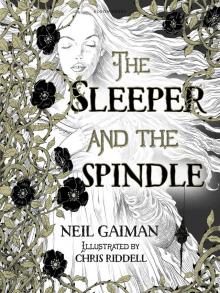 The Sleeper and the Spindle
The Sleeper and the Spindle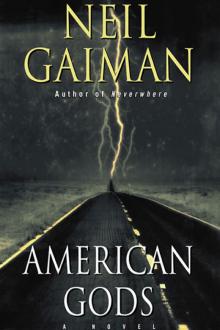 American Gods
American Gods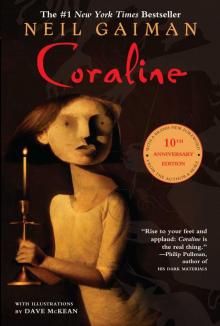 Coraline
Coraline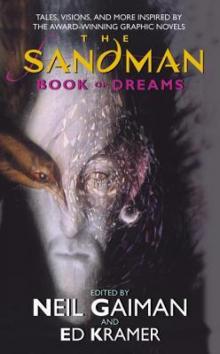 The Sandman: Book of Dreams
The Sandman: Book of Dreams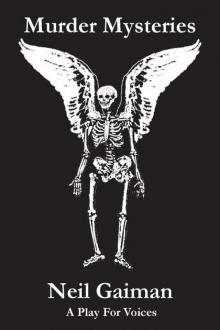 Murder Mysteries
Murder Mysteries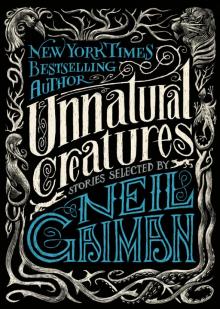 Unnatural Creatures
Unnatural Creatures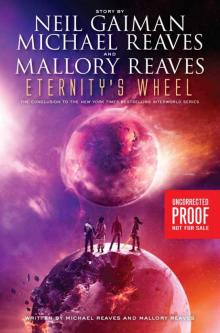 Eternity's Wheel
Eternity's Wheel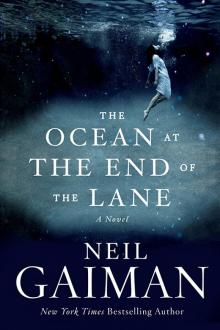 The Ocean at the End of the Lane
The Ocean at the End of the Lane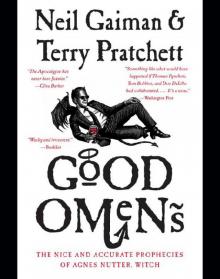 Good Omens
Good Omens Stardust
Stardust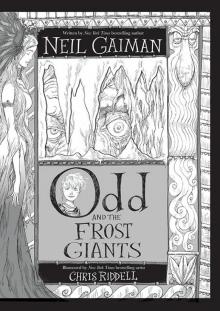 Odd and the Frost Giants
Odd and the Frost Giants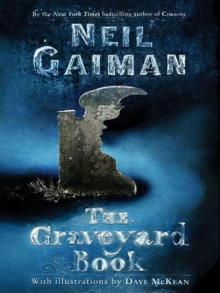 The Graveyard Book
The Graveyard Book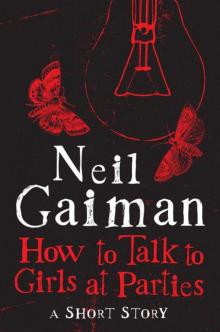 How to Talk to Girls at Parties
How to Talk to Girls at Parties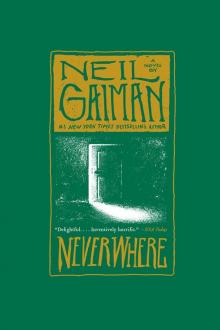 Neverwhere
Neverwhere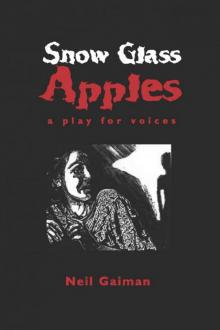 Snow, Glass, Apples
Snow, Glass, Apples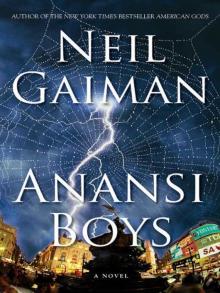 Anansi Boys
Anansi Boys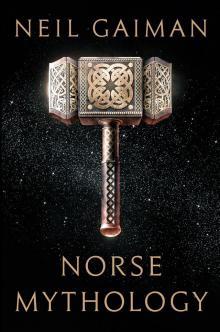 Norse Mythology
Norse Mythology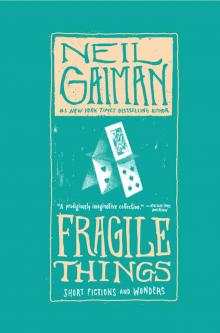 Fragile Things: Short Fictions and Wonders
Fragile Things: Short Fictions and Wonders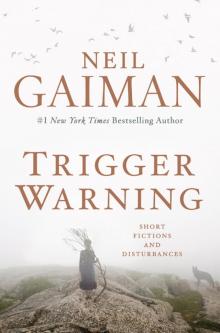 Trigger Warning: Short Fictions and Disturbances
Trigger Warning: Short Fictions and Disturbances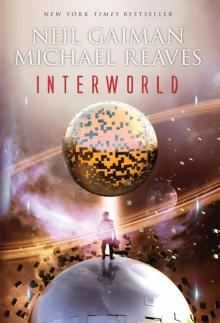 InterWorld
InterWorld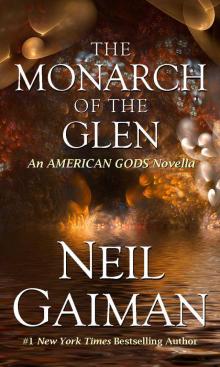 The Monarch of the Glen
The Monarch of the Glen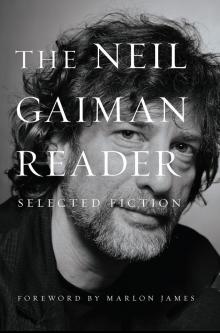 The Neil Gaiman Reader
The Neil Gaiman Reader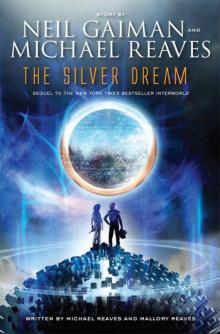 The Silver Dream
The Silver Dream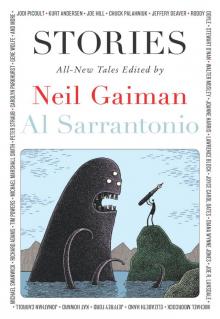 Stories
Stories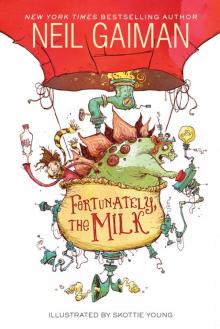 Fortunately, the Milk
Fortunately, the Milk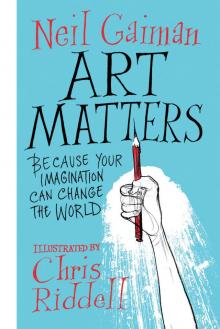 Art Matters
Art Matters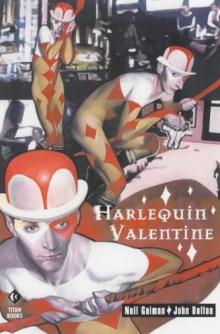 Harlequin Valentine
Harlequin Valentine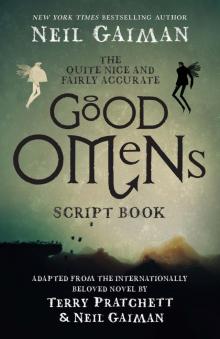 The Quite Nice and Fairly Accurate Good Omens Script Book
The Quite Nice and Fairly Accurate Good Omens Script Book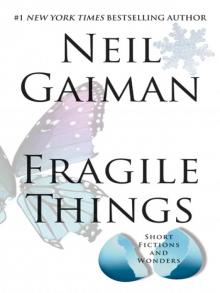 Fragile Things
Fragile Things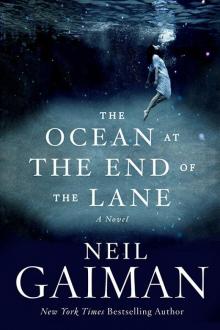 The Ocean at the End of the Lane: A Novel
The Ocean at the End of the Lane: A Novel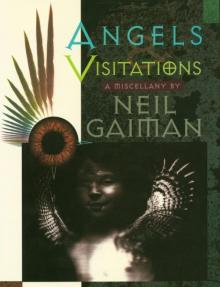 Angels and Visitations
Angels and Visitations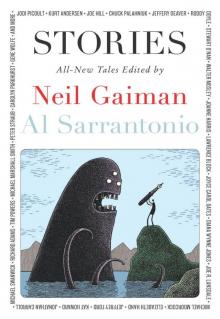 Stories: All-New Tales ngss-1
Stories: All-New Tales ngss-1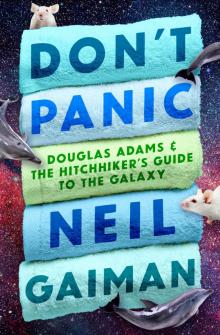 Don't Panic
Don't Panic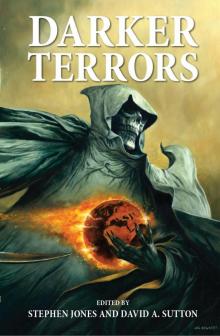 Darker Terrors
Darker Terrors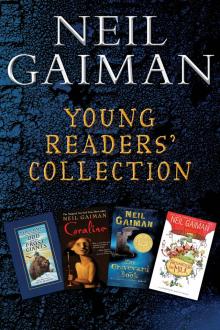 Neil Gaiman Young Readers' Collection
Neil Gaiman Young Readers' Collection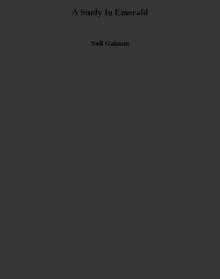 A Study In Emerald
A Study In Emerald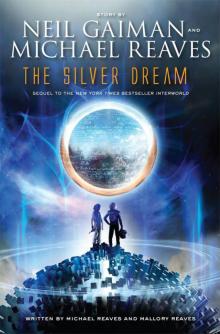 The Silver Dream: An InterWorld Novel
The Silver Dream: An InterWorld Novel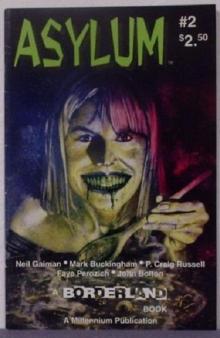 Feeders and Eaters
Feeders and Eaters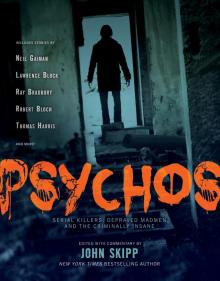 Psychos
Psychos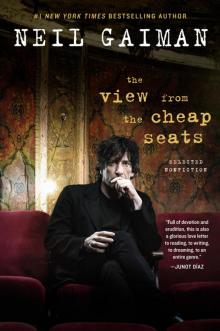 The View from the Cheap Seats
The View from the Cheap Seats Trigger Warning
Trigger Warning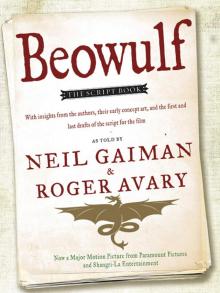 Beowulf
Beowulf Nessun Dove
Nessun Dove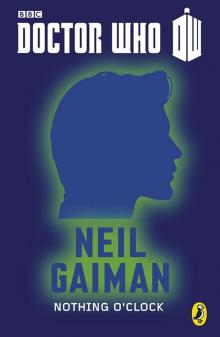 Doctor Who: Nothing O'Clock: Eleventh Doctor: 50th Anniversary
Doctor Who: Nothing O'Clock: Eleventh Doctor: 50th Anniversary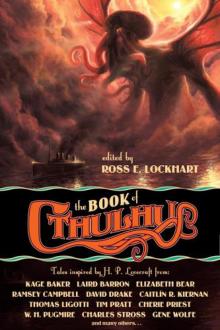 The Book of Cthulhu
The Book of Cthulhu